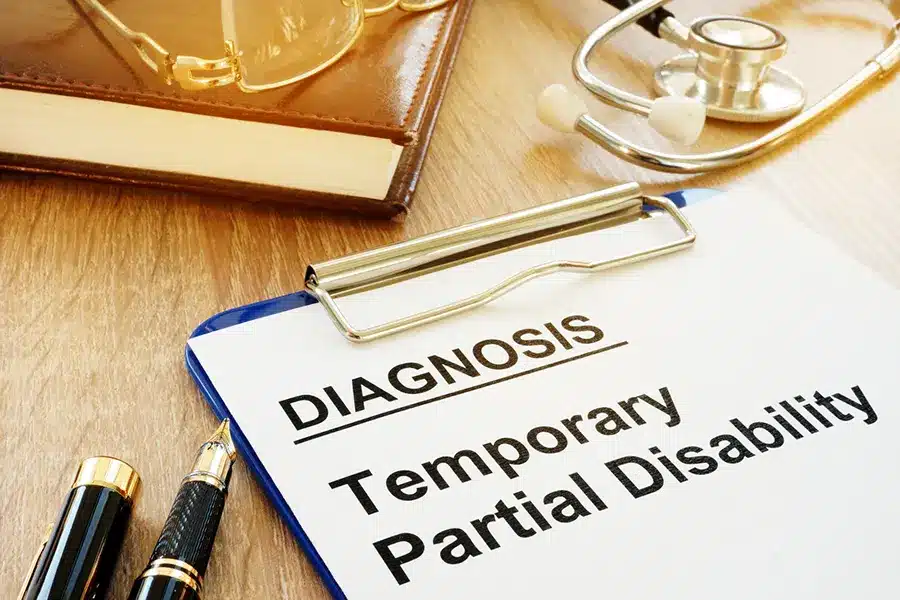Understand your right to TPD benefits and how to apply after a work injury in North Carolina
Workers’ compensation benefits are a critical lifeline for employees who experience work-related injuries, illnesses or diseases, allowing them to maintain financial stability during challenging times.
In North Carolina, the workers’ compensation system is instrumental in offering essential support to these workers, providing for their medical and rehabilitation expenses as well as lost income, significantly reducing the financial strain on injured employees and their loved ones.
For those who can return to work but in a limited capacity due to a work-related injury, understanding their right to temporary partial disability (TPD) benefits and complying with doctor’s restrictions is crucial.
Are you overwhelmed by the process of filing a workers’ compensation claim? The experienced Charlotte work injury attorneys at Wilder Pantazis Law Group can help!
Schedule a free consultation today.
What is the difference between full disability and partial disability?
Full disability, often termed as total disability in workers’ compensation, indicates that an individual is completely unable to perform any work because of their condition. This can be either temporary or permanent.
Partial disability, on the other hand, means the individual is still capable of working, but their capacity to perform certain job duties is limited or reduced after their injury. This, too, can be either temporary or permanent.
Consequently, the benefits for full disability are typically higher and are meant to compensate for the worker’s complete loss of earning capacity, while partial disability benefits are designed to make up for the difference between the worker’s pre-injury and post-injury earnings, reflecting their reduced ability to earn.
What is temporary partial disability (TPD)?
Temporary partial disability (TPD) in the context of workers’ compensation occurs when an employee who has sustained a work-related injury, illness or disease is able to return to work but only in a limited capacity.
Essentially, if an injured worker can return to work but cannot perform all the duties they could before the injury, or if they must work reduced hours, they may be eligible for temporary partial disability (TPD) benefits under North Carolina workers’ compensation law.
The purpose of TPD benefits is to compensate the employee for the difference in earnings due to their injury. This means if an employee earns less now because they are working fewer hours or in a lower-paying position due to their injury, TPD benefits will help make up some of the wage gap.
Which work injuries and conditions typically qualify for TPD benefits?
Any work-related injury, illness or disease that occurs in the “course and scope” of employment typically qualifies for workers’ compensation benefits, including temporary partial disability (TPD) benefits.
Examples of common work-related injuries and health conditions that often qualify for TPD benefits include the following:
- Repetitive strain injuries, such as carpal tunnel syndrome or tendonitis, are common in jobs requiring repetitive motions, and these conditions can lead to situations where the worker might return to work with modified duties.
- Musculoskeletal injuries, like back or knee injuries from overexertion or a slip-and-fall accident, often allow workers to return to work but prevent them from performing physically demanding tasks as they did before the injury.
- Fractures sustained in the workplace can often result in a worker being able to return to work in a limited capacity. For instance, a worker with a fractured arm might be able to perform tasks that don’t require heavy lifting, while a worker with a leg fracture might return to a desk job with modifications, like reduced hours or ergonomic accommodations.
- Mild traumatic brain injuries can result in temporary cognitive impairments, allowing the worker to carry out less demanding tasks.
- Post-surgery recovery from injuries to the shoulder, knee or hip might allow an employee to work but limit their capabilities, necessitating a temporary shift to lighter duties.
Additionally, in cases of partial recovery from severe injuries, a worker might be able to return to work but not at their full capacity.
What does “course and scope of employment” mean?
Understand the concept of “course and scope” and how it affects your workers’ compensation claim in North Carolina.
How is TPD calculated in NC?
In North Carolina, the calculation of temporary partial disability (TPD) benefits under workers’ compensation involves comparing the worker’s pre-injury earnings with their post-injury earnings.
Here’s a general overview of how TPD is calculated:
- Determine average weekly wage (AWW) pre-injury. First, the average weekly wage the worker was earning before the injury is calculated. This is typically based on the worker’s earnings in the year prior to the injury and includes overtime, bonuses and other benefits.
- Assess current earning capacity. Next, the amount the worker is able to earn after the injury is determined. This considers the reduced capacity in which the worker is now employed, whether it’s fewer hours, a different role or a lower-paying job.
- Calculate the benefit amount. TPD benefits are generally two-thirds of the difference between the pre-injury and post-injury wages. For example, if a worker’s pre-injury AWW was $600 and they are now able to earn only $400 per week, the difference is $200. Two-thirds of this difference, which is approximately $133.33, would be the weekly TPD benefit.
Please note that these calculations are subject to a weekly minimum and maximum limit ($1,254 as of January 1, 2023) set by North Carolina’s workers’ compensation laws. These limits are adjusted annually and are designed to ensure that benefits are fair and reflect economic conditions.
Consulting with a workers’ compensation attorney can provide clarity and assistance in accurately determining benefit amounts.
How long can I get TPD benefits in North Carolina?
The duration for which TPD benefits are paid largely depends on the worker’s recovery and ability to return to their previous earning capacity.
These benefits generally continue until the worker can resume their original job at the same pay, reaches maximum medical improvement (MMI) as determined by their physician, or the benefit period expires, which is typically 500 weeks.
How do I apply for TPD benefits in North Carolina?
Applying for temporary partial disability (TPD) benefits in North Carolina involves filing a workers’ compensation claim. Below are the general steps you should follow:
- Report your Injury. Inform your employer about your injury or illness as soon as possible. North Carolina law requires you to report the injury in writing within 30 days, but it’s best to do this immediately.
- Seek medical treatment. Get medical attention for your injury or illness. Make sure to tell the health care provider that it’s work-related, as this medical documentation will be essential for a successful claim. Also, follow all prescribed treatments and attend all follow-up appointments.
- Document your injury and work status. Keep detailed records of your injury, medical treatment, and any work limitations or changes in your job duties and hours. This documentation will be important for your claim.
- File your claim. Next, you should file a claim with the North Carolina Industrial Commission (NCIC). This is done by submitting Form 18 (Notice of Accident to Employer and Claim of Employee, Representative, or Dependent) to the NCIC within 2 years of the injury, but the sooner, the better.
- Provide information about reduced earnings. If you return to work at reduced hours or in a lower-paying role due to your injury, provide evidence of your reduced earnings. This can include pay stubs or a letter from your employer.
- Wait for a decision on your claim. If your claim is approved by your employer’s workers’ compensation insurer, you will start receiving TPD benefits based on the calculated difference between your pre-injury and post-injury wages.
If your claim is denied or if there are disagreements over the benefits, you have the right to appeal the decision. This process could involve mediation or hearings before the NCIC. It’s highly recommended that you seek legal assistance if you reach this stage.
What to expect after hiring a workers’ compensation lawyer
Learn about the workers’ compensation claims process in North Carolina—from calling an attorney to taking your claim to court (if necessary).
What if my injury gets worse and I’m no longer able to work? How do I report this, and how will it affect my benefits?
If your medical condition worsens while you are receiving TPD benefits to the point where you are no longer able to work in any capacity, including light-duty work, the first thing you need to do is consult with your health care provider so they can assess your condition and determine if your work-related injury or illness has indeed worsened to the extent that you’re unable to work.
If your health care provider determines you can’t continue working, you will need to file a request to modify your benefits from temporary partial disability (TPD) to temporary total disability (TTD) or possibly permanent total disability (PTD), if applicable. This process typically involves submitting the necessary forms and medical evidence to the North Carolina Industrial Commission (NCIC).
If your request is approved, your benefits will be adjusted accordingly. In the case of a transition from TPD to TTD, your benefit amount will likely increase, reflecting the change from partial disability to total disability.
As always, if your claim is denied, consult an attorney for help filing an appeal.
Get help from an experienced Charlotte workers’ compensation attorney
Experiencing a workplace injury, illness, or disease can be overwhelming, but you don’t have to navigate the workers’ compensation process alone. Turn to the knowledgeable Charlotte work injury attorneys at Wilder Pantazis Law Group for expert guidance.



